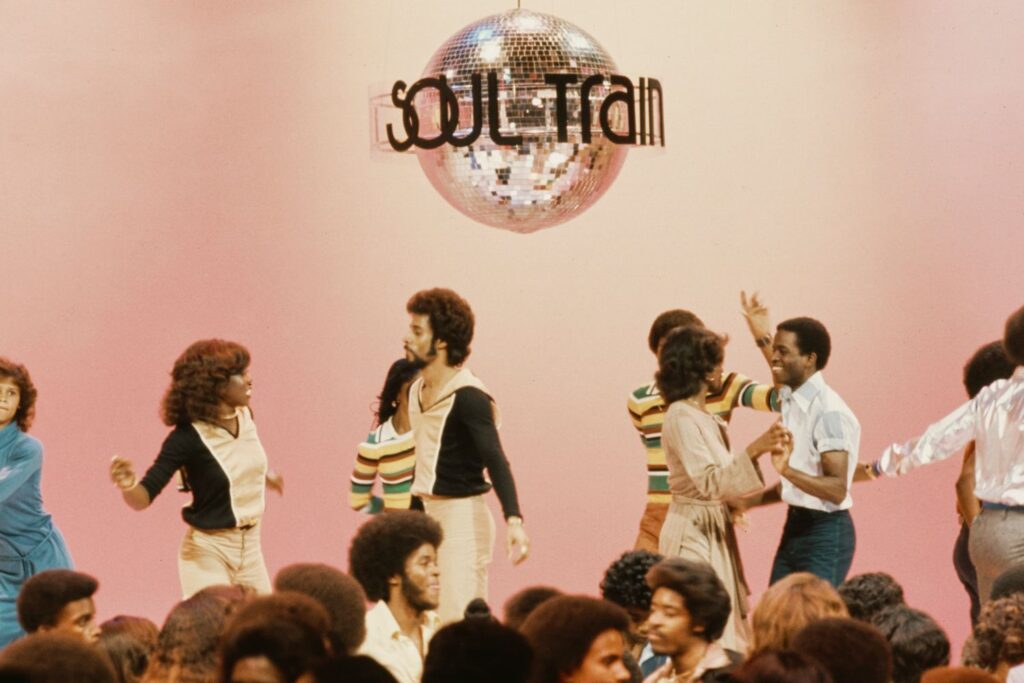NEED TO KNOW
Soul Train continues to convey love, peace and soul, 55 years after first gracing television screens.
What became a beloved fixture in American television history first started as a road show. After being hired by Chicago’s WVON radio station to cover news and sports, a young reporter named Don Cornelius also found a way to promote concerts featuring area talent at high schools across Chicago.
The traveling show was dubbed The Soul Train, and in 1970, Cornelius was offered the opportunity to bring it to TV. On Aug. 17, 1970, The Soul Train made its debut in Chicago on WCIU, airing weekday afternoons.
It took just a year for Soul Train to become a success. A single sponsor turned into several, allowing the show a chance at syndication. By October 1971, Soul Train was brought to viewers in metro areas including Atlanta, Detroit, Houston, Philadelphia and Los Angeles.
Never miss a story — sign up for PEOPLE’s free daily newsletter to stay up-to-date on the best of what PEOPLE has to offer, from celebrity news to compelling human interest stories.
Michael Ochs Archives/Getty
The show would ultimately move to Los Angeles and live out an incredible 36-year run. It was one of the first for Black audiences, made by Black creatives. It celebrated every facet of culture, from music to fashion and, of course, dance.
Cornelius served as host from 1970 through 1993, at which point he started sharing his hosting duties with a variety of celebrity cohosts. It was there that his first successor, Mystro Clark, was given the chance that would lead to his own hosting gig.
“I guest-hosted Soul Train one time, when Don was still there. It was his way, I guess, of auditioning people without actually being gone yet, ” Clark tells PEOPLE.
“It was models and random people who didn’t really have hosting experience. I had already done my sitcom on Fox, so I guest-hosted.”
Clark continued, “I think my first guest was Tevin Campbell. I ad-libbed some of the questions, and at first, [Cornelius] didn’t like it. But afterwards, he came up to me and he was like, ‘Well, yeah, I was going to tell you to do it over, but Tevin liked it. He thought you were funny, so we’ll keep it.’ ”
Ron Galella, Ltd./Ron Galella Collection/Getty
The move made Clark stand out to Cornelius, who approached him when it came time to move on to another host.
“When he decided to step down, he called my manager. They had already known each other from some other business and asked if I’d be interested in taking the job over as the full-time host. And I’m like, ‘Oh, of course. That’s one of those once-in-a-lifetime things.’ ”
He continued, “I grew up watching Soul Train in Ohio. It didn’t hit me yet that taking over this iconic show that people grew up watching.”
Clark gave it a lot of thought after learning he was in the running. After a lunch with Cornelius, “It was pretty much done.” He would take the reins from 1997 through 1999.
Frederick M. Brown/Getty
At the start of a new millennium, it came time for another host. Shemar Moore took the helm in 2000 and hosted the show until 2003, when Dorian Gregory got his chance.
Like Clark, Gregory was reached out to after a successful guest-hosting gig on the show.
“It was 1996 that I was a guest host on Soul Train. I got a call from an associate of mine who was heavy in the music business. And I think she was the one that originally connected the dots,” he recalls.
“I just remember my first opportunity to be on there was like being caught up in this magic bubble. It’s like, ‘Is this really happening?’ Unbeknownst to me, Don always had it in mind from my first guest appearance in 1996. It was around 2003 when I got a call that they were interested,” Gregory shares.
During his guest-hosting gig, Gregory hadn’t gotten the chance to meet Cornelius. When he finally did, he saw the media maven was “the epitome of coolness and class and edge.”
Michael Ochs Archives/Getty
“He was ahead of the time and groundbreaking in making things happen. But then Don is reminiscent to me of that powerful, strong, Black, solid man-made thing of the male figures of my time. So I had a ‘comfort’ with this bigger-than-life presence of who Don was because that’s what I grew up with.”
He also recognized that stepping into this legacy meant “big shoes” to fill, “But you don’t have time to really think about it.”
“I got there with the excitement of his guidance and found he was very hands-on, as far as how the show lays out and how he gets vision. And so I was more in the moment of taking it all in, and trying to also be me and display that, but listening, paying attention.”
Michael Ochs Archives/Getty
Gregory saw the show through its broadcast conclusion in 2006. Six years later, Cornelius died of a self-inflicted gunshot wound on Feb. 1, 2012, after experiencing seizures for 15 years and suffering “extreme pain,” according to son Tony Cornelius, who helped manage the show behind the scenes from the early 90s through its conclusion.
Recognized today as a piece of television history and so much more, each of the men shares their gratitude for being among those in Soul Train history.
“To me, it means a lot as far as just having my name associated with it, as far as it was an iconic 30-plus year television show that was started and mostly run by a Black man, for Black people that Black audiences latched on to and watched every week in their households. So it made a huge difference in our society and our neighborhoods, as far as being able to see people that look like us on TV having a good time and not just being broke or going to jail and all that,” Clark says.
“It was just young black people having fun dancing and showing what they could do, stuff you would only get to see if you lived in an old neighborhood and all that. So that part meant a lot to me. I wanted to honor that part of it and preserve that part of it.”
Soul Train/Getty
Clark continues, “Now, my name is linked in the history books as part of Soul Train also. It was only three years or one small blip of the time that it was on air, but it still was a powerful, positive moment, just because people all over the world are aware of it now. They have Soul Train in Japan. And I was the one that Don handpicked to take over for him. I was the first full-time host other than Don.”
Of those who followed him, Clark says, “In the legacy of hosts, there’s only a few of us that can say we were actually the full-time host of Soul Train. That’s a small, pretty elite group to be a part of, so I’m proud of that.”
Gregory reflected on his hosting time as well, sharing, “Soul Train holds such a special space for me, and I’m certain for all of us. It was that comfort blanket, that connected bond, going back to when I was a kid to when I was in high school and college and even today, as my career progresses. To actually be a part of this iconic piece of history, American history, Black history, music history, worldwide history, it was just bananas.”
Soul Train/Getty
“I don’t care where you go, you say Soul Train, they know. And there’s a joy whenever you say Soul Train. I think it did what it needed to do,” he continues.
“I think Soul Train has a place today. I think Soul Train has a place eternally for what it was. It constantly grew. If you go back to its inception and its continual keeping up with what was happening as far as the industry is concerned, I think it’s a true need in the industry currently, in live performance. Soul Train allowed a place for new, up-and-coming artists, as well as well-established artists. You had them all on one stage, all on one show.”
Gregory concludes, “That’s such a unique, hard-to-do combination. And so, Soul Train still exists.”

